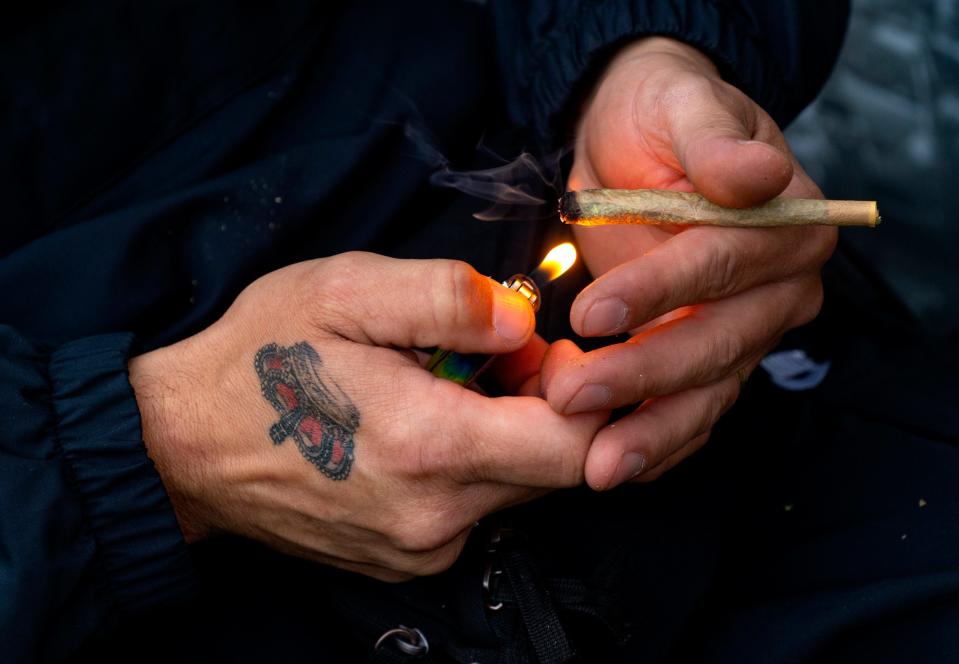NY opens applications for cannabis dispensaries to people impacted by drug convictions
New Yorkers can now apply to operate the state's first 150 cannabis dispensaries, as New York rolls out its fledgling industry that aims to prioritize those affected by the decades-long prohibition on marijuana.
On Thursday, the online application opened for conditional adult-use retail dispensary (CAURD) licenses. These qualifying businesses are set to make the first sales of cannabis to people over 21 years old in the state by the end of 2022; they will also get public financing to operate the business following the state’s 2021 law legalizing marijuana.
To qualify for the license, applicants must have been affected by strict drug laws that criminalized marijuana for decades. Black and Latino communities have consistently been overrepresented in marijuana-related arrests, a wrong the state aims to address in part with these licenses.
“We’re not hiding from the dark history that has plagued our state,” said Damian Fagon, the chief equity officer for the state Office of Cannabis Management, the state agency tasked with overseeing the industry, in a virtual press conference announcing the application portal opening. “We’re shining a light on it and moving forward together.”
The office will issue 150 licenses to open dispensaries. Those businesses will receive support via a $200 million fund to help with identifying locations and running the businesses.
By the end of the year, these dispensaries are set to sell New York-grown marijuana harvested by one of the state’s more than 220 cannabis farms that received conditional cultivator licenses in 2022.

Those include Roberto Leslie, a Black farmer who owns Clear Natural, a cultivating company that will provide product to the stores. Conditional cultivators needed to have experience in hemp before receiving their state license.
“I feel excited and honored to be able to bring top quality New York State-grown and processed products to the adult market through this CAURD program,” he said. “This is unprecedented.”
Righting wrongsPeople with weed convictions may get NY’s first retail cannabis licenses, state says
A growing fieldNew York's first legal marijuana crop is growing and bound for stores this year
Where will dispensaries go?
Those interested in applying for CAURD must pay a $2,000 nonrefundable fee. Applicants also must indicate five of the state’s 14 geographic regions they prefer to operate a dispensary.
Here's a breakdown of licenses per region, according to a listing by the Office of Cannabis Management:
New York City - 70 total (each borough was allocated a specific amount)
Long Island - 20
Mid-Hudson - 17
Western New York - 11
Finger Lakes - 9
Central New York -7
Capital Region - 7
Mohawk Valley - 2
North Country - 4
Southern Tier - 3
What are the criteria to apply?
The application is similar to applying to become a minority and women-owned business enterprise, Fagon said, referring to a state certification meant to provide state contracts and other opportunities to people from historically marginalized backgrounds.
CAURD is highly selective, with the license focused on the term “justice-involved.” This means that applicants need to have a marijuana-related offense conviction that occurred prior to when former Gov. Andrew Cuomo signed the Marijuana Regulation and Tax Act into law on March 31, 2021. People can also apply if their parent, legal guardian, child, spouse, or dependent had a marijuana-related offense conviction in New York State prior to the law’s passage.
In addition, applicants need to show they have experience owning and operating a business that’s been profitable for two years.
Nonprofits that serve justice-involved people and communities disparately affected by the cannabis prohibition can also apply. To do so, they must show they’ve been profitable and have a history of creating opportunities for communities they serve, and that members of those communities are part of their board.

‘An example of what can be done across the country’
Urban Upbound, a New York City nonprofit that seeks to address cycles of poverty in public housing, plans to apply, according to the organization’s co-founder, Bishop Mitchell Taylor.
He pointed to challenges for Black and brown people affected by harsh laws related to marijuana.
“To not just give them a license, but to operationalize it, this is tremendous,” he said.
Gia Morón, the president of Women Grow, a company that aims to increase the number of women in the cannabis industry, said education and resources will be key to meet equity goals.
“We’re hopeful that people will look at what we’re doing in New York as an example of what can be done across the country,” she said.
The window to apply for CAURD ends Sept. 26. If applicants don’t get approved for the license, the state is set to begin phasing in its nine other licenses for the cannabis industry – ranging from nurseries to weed bars.
Half of all licenses must go to what state regulators call “social and economic equity applicants.” Along with people affected by harsh drug laws, includes underrepresented groups such as minority and women-owned businesses, disadvantaged farmers and veterans with disabilities.
Chris Alexander, director of the cannabis management office, pointed to the 2021 legalization law’s goals to address the marijuana prohibition’s harm on Black and brown New Yorkers.
“It’s our commitment for that law to really be the floor of all the steps that we take to reach and achieve real equity here,” he said.
Eduardo Cuevas covers race and justice for the USA TODAY Network of New York. He can be reached at EMCuevas1@gannett.com and followed on Twitter @eduardomcuevas.
This article originally appeared on New York State Team: New York accepting applications to operate a cannabis dispensary

